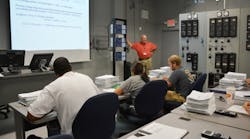Richmond Community College in North Carolina has provided a solution for the need for a trained workforce for the electric utility industry. In 2012, the college worked directly with Progress Energy and Duke Power to develop a 2-year associate’s degree program to address the shortage of qualified technicians in relay and substation maintenance. Richmond Community College worked with the industry to create a hands-on program that provided the skill sets needed for its graduates to be of immediate benefit to their employer.
The college actually built a substation and relay lab on its campus, providing a real-world environment in which to train. The goal was to shave two to three years off of a traditional entry-level substation or relay maintenance technician’s education, making the student qualified to work right out of the gate.
Steve Lampley leads the program, developing the courses for the Richmond Electric Utility Substation and Relay Technology program based on his 42 years of experience the industry. Lampley has worked in various roles within Carolina Power & Light, Progress Energy, and Duke Energy. He worked in substation, protective relaying, technical support for maintenance organizations and asset management.
“In our relaying environment we handled all protective relaying from the generators to the distribution feeder breakers. I also participated in and led many failure root cause investigations,” Lampley said.
He has been at the college for three years where he created nine new courses specific to this new substation degree. The leaders utilized existing math, AC-DC theory, physics and other courses already in the school course complement within the program.
The program is designed to train substation and protective relay technicians for the utility industry. The program is rigorous and maintains a balance between the theory and the real-world application of the theory in the utility industry. Students are taught the theory, why tests are performed and then are required to perform the test on all facets of transmission related equipment and protective relays. The students are using the same test equipment the utilities are using. The college has had contact, visits, or placed students with Duke, Dominion, PECO, PEPCO, Santee Cooper, South Carolina Electric and Gas, SPX Waukesha, NASS, NAPC, Doble, EPS, Southwest Electric, and others.
“This program has the potential to raise the technical level of competency for the technicians maintaining the equipment in America’s high voltage power grid,” Lampley said.
The courses in the program cover everything from the substation ground grid and station batteries to the transformer SFRA test and generation protection. All of the courses are evolving and continuously improving.
Doble partnered with Richmond to provide testing equipment so students could perform actual, hands-on testing.
“To our knowledge, there is no other academically accredited program in the nation that has this type of equipment and dedicated lab environment. Our goal was to go beyond the classroom knowledge and theory,” said Brent Barbee, Executive Vice President & CFO of Richmond Community College. “We have had great success in placing our graduates with careers in the power industry and as more companies learn about our program, the demand has dramatically increased.” The program currently has additional room for students.
The demand for the graduates is what Lampley likes most about his job right now. “There are terrific opportunities in the utility industry, and we are preparing them for a career, not a job: a career that requires a lifetime of learning,” he said.
Lampley happened upon his career in 1970, when he needed a job. “I had no idea what I was getting into but took to it like a duck to water. It was a great career,” he said. “I came to Richmond Community College to help create something that would benefits this college, community and the utility industry.”
He wanted to give back some of what had been given to him, so he enjoys teaching. Lampley also reads, gardens, builds furniture, hunts, fishes, and jet skis.


